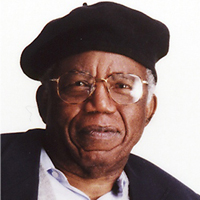Colonialist Criticism by Chinua Achebe: Critical Interpretation
Chinua Achebe maintains that European white critics-scholars can't criticize and interpret the third world African literary works. Although the European critics claim to have thorough knowledge of the African literature, their claim remains to be unreliable.

Chenua Achebe
They (those European white critics) claim as though they can judge African literary work objectively without any bias. But according to Achebe those European critics do not try to understand, the local African literature in its own context, in its own specificity and in its own indigenous cultural ethos. To the utter surprise of the African readers, they apply the abstract European literary and critical standard of generality and universality to evaluate the African literature. A work of art is always grounded in the world it represents. Cultural practices, social customs and indigenous sense of locatedness have to be taken into consideration; else the critical judgment of a work of art remains biased. When Achebe happened to find how the white (European) interpreted African novel with their European perspective and conception, he was deeply dissatisfied with such a trend. He called those biased criticism of African novels by the white European critics as the colonialist criticism. Criticism of African literature by the white European critics is called colonialist criticism I because this mode of criticism is tainted with the ethos of colonialism. The given essay "Colonialist criticism" is an attack on a lingering colonialism in the criticism of African literature, mainly but not entirely by non-Africans. The faults of this criticism stem from implied assumptions that the African writer is a somewhat unfinished European, and that somehow outsiders can know Africa better than ' the native writers. These assumptions lead to, among other things, the specious man-of-two-worlds theory of the African intellectual and imply a continued European arrogance.
Achebe, criticized American and British critics of contemporary African literature for praising universality whenever they sensed its presence: for praising fiction that transcended African parochialism, although set in Africa, and dealt with the universally human, even though its characters happened, to be Africans.
Achebe's point is that the colonialist critics did not really have any conception of the universally human. They say universal, but they mean, without knowing it, western or, like us. Achebe argues: "I should like to see the word universal banned altogether from discussions of African literature, until such a time as people began to use it as a synonym for the narrow, self-serving parochialism of Europe".
Achebe's principle theoretical point involves his rejection of universalism, represented by critical statements that generalize the particularity out of African literature. The, two problems with universalism, according to Achebe, are first that the presumed universality that critics find is merely a synonym for the narrow self-serving parochialism of Europe and second, that every literature must speak of a particular place, evolve out of the necessities of its history, past and current and the aspirations and destiny of its people. It would seem, then, that if there is to be a concrete universal in African literature it must stem from a much deeper human source than any parochial view can uncover. But Achebe does not say this. Rather, his concentration is on the particular love, for he puts literature, at least his writings, in service of the need to alter specific things in specific places, especially attitudes. It is in this context that Achebe defends the high moral and social earnestness of Christopher okigbo against the charge of outspokenness. Achebe's point is that earnestness is appropriate to okigbo's and his situation and that acertain levity would be inappropriate.
Colonialist Criticism Reading
Colonialist Criticism: Critical Commentary
Coloniasist Criticism: Summary
 |
bachelorandmaster.com |